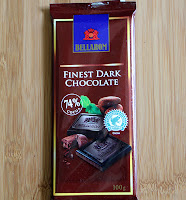Despite running more stores than fellow discounter Aldi,
(nearly 600 versus Aldi’s 400) Lidl remain
smaller in market share, and have not managed to achieve Aldi rates of growth.
In the last quarter Aldi’s market share was 3.6% and its sales grew 30% year on
year. Lidl’s share was 3%, and it grew by 9%.
Why might there be this disparity in performance? I visited
the Lidl store in Penicuik in the Scottish borders to find clues.
Both Aldi and Lidl sell products at prices far lower than
available in mainstream supermarkets.( The dark chocolate pictured sells at 79p versus the branded equvalent at £1.85p). Lidl follows many of the practices
embraced by Aldi, designed to make the cost of operating the stores very low,
and passing the benefits of the low cost base on to shoppers. Both sell a small
range of products under brand names that few have heard of, many of which are
imported. The small range means smaller stores which are cheaper to run.
Products are displayed in their outer cases as opposed to being unpacked and
placed on the shelf, saving staff costs. Costs are also saved by having fewer
checkouts, and employing super fast till checkout operators. Both stores
encourage those with alot of shopping to pack away from the till, again
speeding up the process.
Lidl differs from Aldi in that it offers more big name
brands and it is difficult to judge whether this deviation from the standard
discount model results in increased sales by attracting shoppers who like to
buy known brands or whether the added cost means that prices are possibly not
quite as low as Aldi.
Lidl’s fresh food offer seems more attractive than Aldi’s.
Many breads are baked on the premises, and attractively displayed in wicker
baskets. Most of the meat on offer was produced in Scotland, well displayed in
stand alone chiller cabinets, and
accompanied by an explanation of Lidl’s animal welfare standards. Some ham was
imported but British product was available. Certainly the Scottish produced pork
chops purchased at the Penicuik store were excellent.
The fruit and vegetables looked fresh enough, but do not
display a sell by date (another cost saving action employed by both discounters
as once a sell by date is reached product has to be sold at a heavy discount.)
It was therefore disappointing that my Jersey Royal potatoes, albeit costing 18p per kilo less that Sainsburys, had
turned green by the day after purchase.
Overall though, the combination of availability of major
brands and generally good quality fresh food made the shopping experience in Lidl Penicuik more like that in a major supermarket than
does Aldi and the company embraces more
consumer trends like attention to animal welfare and supporting local produce.
So why would Lidl be growing more slowly than Aldi?
One answer could be that Aldi are opening more stores than
Lidl.
It could be that prices are not as sharp, or product quality
in general not as good. Aldi seems to do particularly well when it comes to
food awards.
My guess is that Lidl’s marketing is not as good as Aldi’s. Aldi generates more publicity in the papers
than Lidl - it is always Aldi that journalists write about when doing a feature
on discount stores. And Aldi has
promoted and advertised its products more heavily.
This could be why Lidl have embarked on two advertising campaigns,
one talking about the quality of its fresh food, the other highlighting
packaged products that consumers rate as highly as major brands, but which cost
considerably less.
If Lidl wants to grow faster it needs to make sure its activities are squeaky clean.
Lidl, like Aldi, was caught up in the horsemeat scandal. There has been a recent allegation that Lidl only pays UK
tax of around £12,000 on a business with a £3 billion turnover. Lidl of course
claims that it complies completely with UK tax laws. Whilst unlikely to have
impacted on sales growth to date, such an allegation will do little to enhance
the company’s reputation.
Which is unfortunate as it seems to have much to
offer its customers, particularly in difficult economic times.

1 comment:
In Finland Lidl grew almost 20% last year. I guess growth came from bakery where you get fresh bread, donuts etc.
My opinion is that Lidl really is the best store in Finland. Great quality food all over Europe and lots of local stuff as well (Finnish milk, greens, butter..). Sometimes English, French themed food as well so I can't complain. Try also Bellarom (creamy) and J.D. Gross (premium) chocolates.
Post a Comment